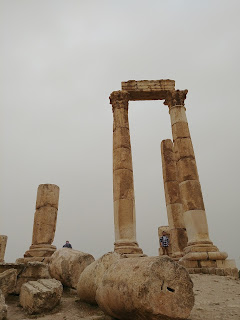Amman, Jordan....... April 25th, 2018
The funny thing about travelling to the other side of the world is that you totally lose a day of your life.
I left Vancouver at 9:00 pm on April 23rd and arrived at my hotel in Jordan shortly after midnite April 25th. Yes, there were two flights in there and 10 hours of time change, but it seems strange that April 24th just disappeared.
 |
| The view of Amman from my hotel window, |

It was dark when I arrived last night (or, more accurately,
early this morning, so I did not have a chance to see any of Amman beyond the
airport and the cab. So, after a good night’s sleep I was eager to throw open
the drapes and see what I could see.
My cabbie had warned me the weather has been cooler than
usual and they had been getting some rain. So, I was not surprised to be
greeted by an overcast day with a lot of haze over the city. It still looked
like a desert city… dusty, buildings largely made from stone and brick….all
light sandy colored. In the distance I can see a huge mosque sitting high on
one of the hills.
Amman is quite a modern city but has an old downtown area
that dates thousands of years. Amman is
comprised of seven hills and the city is built around these hills and the
subsequent valleys.
The streets are rather narrow for a city of 4 ½ million and
you pretty much have to bravely dart across the street amidst the traffic.
Most men in Amman dress in the same kind of western fashion
that we do. Some, especially is the old part, will wear the long tunics and
head scarves. But the women all dress very conservatively and traditionally.
All wear a head scarf that wraps completely around covering all of their hair.
They tend to wear quite dramatic and pronounced makeup – probably to make up
for the severe head covering. They must also have their arms and legs covered.
Sometimes it is a flowing long dress, sometimes it’s a long sleeved top and
pants. Jordan is a very muslim country
and their traditions and culture are strong, Their religion is very serious and
there are many mosques. You can hear the chanting of prayers and the bells
calling them to prayer five times a day.
After breakfast I met up with Jan, one of the other members
of the photography group I am meeting up with here. She has also arrived early
and we agree to spend the day exploring Amman. I am assured it is a very safe
city and there is no problem with us wandering around and doing some sightseeing
on our own. We hail a cab and head to
Jebel al Qata (The Citadel), ancient Roman ruins that sit high atop the highest
of the seven hills with endless views across the city. From here will do a
walking tour of the old downtown.
1. The Citadel: A
1700 m wall surrounds the ancient citadel, dating back to the Bronze Age.
Inside the walls there are many artifacts and remnants of the ancient
civilization but the Temple of Hercules with its 2 remaining pillars and the
Ummayed Palace are the highlights.
The Temple of Hercules was built in AD 161-180 and the
Palace in AD 720.
The domed audience hall at the entrance to the Palace is the
best preserved of the buildings.
Wandering through the courtyard you can see
the remains of a 10 m wide colladed street which was flanked by royal
residences and administration buildings as well as the former governor’s
residence and throne room. There is also the remains of a small Basillica
dating back to the 6th or 7th century AD. Now tall
grasses grow through the crumbling stone. And, all around the city sprawls to
the horizons.
2. The Roman Theatre
Originally built in the 2nd century, the theatre has been fully restored and the original materials were not utilized so it is not totally accurate. It seats 6000 people and is still used for performances in the summer. It is massive and extends indefinitely up the hillside.
The only remaining authentic part is The Forum, a row of columns that were originally part of thee one of the largest squares in the Roman Empire (Built in 190AD)
To the left of the Theatre is a smaller, more intact theatre, the Odeon, which seats 500 and was used for smaller performances and music.
3. The Souks.
We wander further... along a busy street dotted with all manner of little shops - nuts, perfumes, souvenirs, and elaborately embroidered dresses - making our way ton the souk. A souk is an Arabic market. There are fruit and vegetable souks with stall after stall of fresh produce -- juicy red strawberries and tomatoes, oranges, melons, vegetable, herbs, spices, fish, nuts, dates.... whatever you want you are sure to find it at the souks.
There are hardware souks that sell tools, electronic gadgets, housewares. There are even women's souks that sell racy lingerie and gold souks where men spend their money on gold.
4. The Mosque.
At the end of the souks is a small mosque, Al Husseiny Mosque, built in 1924 on the site of a former mosque built in the 7th century. There are separate women's and men's sections. The women must wear head covering and a long flowing robe covering their arms and legs. Their section is small simple room, sparse, where the women pray or relax. Windows overlook the much more elaborate and large men's prayer area. All must remove their footwear before entering.
  |
| The men's prayer area. Jan in the required garb. (Yes, I had one too!) |






























AWESOME - loving to hear and see you adventures
ReplyDeleteNice post -- so glad you did all of this on your extra day!
ReplyDelete